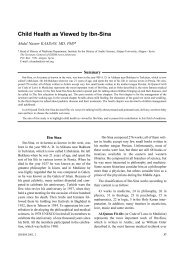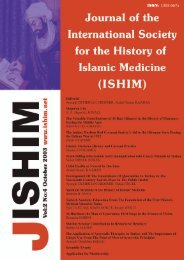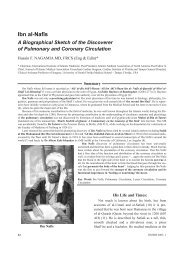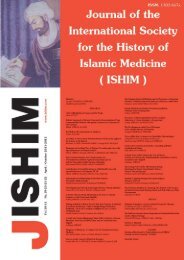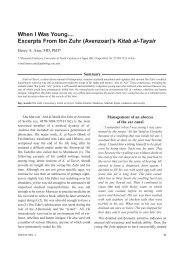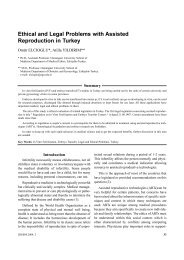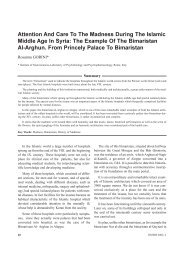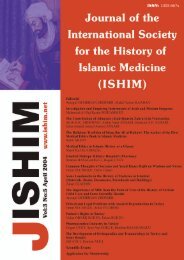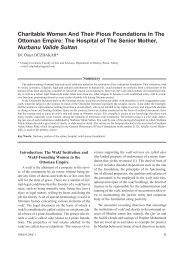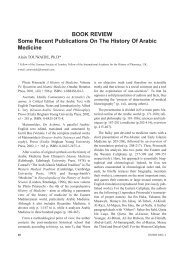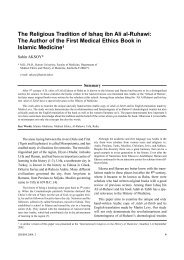A Short History of Islamic Pharmacy - International Society for the ...
A Short History of Islamic Pharmacy - International Society for the ...
A Short History of Islamic Pharmacy - International Society for the ...
You also want an ePaper? Increase the reach of your titles
YUMPU automatically turns print PDFs into web optimized ePapers that Google loves.
A SHORT HISTORY OF ISLAMIC PHARMACY<br />
David W. TSCHANZ<br />
A few books related to pharmacy were written by<br />
<strong>the</strong> famous scholar Ya'qub bin Ishaq al-Kindi (d.<br />
874). His contributions to philosophy, ma<strong>the</strong>matics<br />
and astrology, however, were greater than those on<br />
medicine and <strong>the</strong>rapy. He was an outspoken critic <strong>of</strong><br />
alchemists and attacked <strong>the</strong>ir procedures and claims<br />
as deceptive under <strong>the</strong> circumstances, insisting upon<br />
licensure and training <strong>of</strong> pharmacisits.<br />
Hunayn bin Ishaq’s Ten Treatises on <strong>the</strong> Eye was<br />
completed in 860. It deserves mention because while<br />
<strong>the</strong> first nine treatises dealt with <strong>the</strong> diseases <strong>of</strong> <strong>the</strong><br />
eye, <strong>the</strong> tenth was devoted to compounding drugs <strong>for</strong><br />
eye medication.<br />
Hunayn, whose translation were literally worth<br />
<strong>the</strong>ir weight in gold, corrected <strong>the</strong> translation into<br />
Arabic <strong>of</strong> <strong>the</strong> major part <strong>of</strong> Dioscorides', Materia<br />
Medica, undertaken by his associate Istifan bin Basil<br />
(in <strong>the</strong> mid ninth century). As a result several books<br />
<strong>of</strong> materia medica were written in Arabic.<br />
Recognition<br />
The large hospitals, such as Azud-al Daulah,<br />
employed very large technical and administrative<br />
staff. The hospital was run by a non-medical administrator.<br />
He was assisted by a Chief Medial Officer<br />
(Mutwalli or Dean) who was a physician. The o<strong>the</strong>r<br />
member <strong>of</strong> <strong>the</strong> hospitals troika was <strong>the</strong> Shaikh<br />
Saydalani who served as Chief Chemist and overseer<br />
<strong>of</strong> <strong>the</strong> dispensary.<br />
The post <strong>of</strong> Inspector-General <strong>of</strong> Hospitals was<br />
created during <strong>the</strong> Abbasid regime, which was usually<br />
occupied by <strong>the</strong> most outstanding physician <strong>of</strong> <strong>the</strong><br />
<strong>Islamic</strong> world. Ano<strong>the</strong>r post, that <strong>of</strong> Chief Chemist<br />
was also created, to head <strong>the</strong> Department which<br />
supervised <strong>the</strong> preparation <strong>of</strong> drugs. One <strong>of</strong> <strong>the</strong> most<br />
famous holders <strong>of</strong> <strong>the</strong> position was Zia Ibn Baytar,<br />
<strong>the</strong> great botanist and herbalist who occupied this<br />
post in 1266.<br />
Development <strong>of</strong><br />
Pharmaceutical Literature<br />
The preparation and use <strong>of</strong> medicinal drugs had its<br />
own specialized literature, a trend that accelerated <strong>for</strong>m<br />
<strong>the</strong> Ninth Century onwards. Not surprisingly, early<br />
knowledge <strong>of</strong> medicinal substances was based initially<br />
on <strong>the</strong> approximately 500 substances described by <strong>the</strong><br />
Greek Dioscorides in his treatise on materia medica.<br />
Numerous Arabic and Persian treatises were subsequently<br />
written on medicaments. Medical encyclopedias<br />
usually had one chapter on materia medica<br />
and ano<strong>the</strong>r on recipes <strong>for</strong> compound remedies - <strong>for</strong><br />
example, Razi’s al-Hawi mentions 829 drugs.<br />
Formularies were <strong>of</strong>ten composed as larger independent<br />
collections <strong>of</strong> recipes, and some were written<br />
<strong>for</strong> specific use in hospitals.<br />
Pharmacological drugs were classified into simple<br />
and compound drugs, ‘<strong>the</strong> mufraddat and <strong>the</strong><br />
murakkabat’. The effects <strong>of</strong> <strong>the</strong>se were detailed and<br />
documented in <strong>the</strong> lieterature with a high degree <strong>of</strong><br />
accuracy and completeness.<br />
The earliest <strong>Islamic</strong> works on pharmacognosy<br />
were written be<strong>for</strong>e translation <strong>of</strong> <strong>the</strong> Greek works <strong>of</strong><br />
Dioscorides. Titles such as ‘Treatise on <strong>the</strong> power <strong>of</strong><br />
drugs <strong>the</strong>ir beneficial and <strong>the</strong>ir ill effects’ and <strong>the</strong>n<br />
again The Power <strong>of</strong> simple drugs’ were written in <strong>the</strong><br />
ninth century AD.<br />
<strong>Pharmacy</strong> As a Pr<strong>of</strong>ession<br />
With all this in<strong>for</strong>mation circulating it is not suprising<br />
that <strong>the</strong> <strong>Islamic</strong> saydalani introduce a number <strong>of</strong><br />
new substances and techniques including senna, camphor,<br />
sandalwood, musk, myrrh, cassia, tamarind, nutmeg,<br />
cloves, aconite, ambergris and mercury. They<br />
fur<strong>the</strong>r introduced hemp & henbane as anes<strong>the</strong>tics, and<br />
established <strong>the</strong> monopoly on <strong>the</strong> dispensation <strong>of</strong> ointments,<br />
pills, elixirs, confections, tinctures, suppositories<br />
and inhalants.<br />
As was <strong>the</strong> case in Europe and America up to<br />
modern times, many prominent physicians in Islam,<br />
prepared <strong>the</strong> necessary medications <strong>for</strong> <strong>the</strong>ir patients.<br />
Al-Majusi, az-Zahrawi, and Ibn Sina (d. 1037} are<br />
good examples.<br />
But this was <strong>the</strong> exception, an allowance if you<br />
will, <strong>for</strong> <strong>the</strong> extremely gifted. For <strong>the</strong> typical medical<br />
pr<strong>of</strong>essional, <strong>the</strong> role <strong>of</strong> educated pharmacists in <strong>the</strong><br />
medical field and in society could not be ignored and<br />
was, in fact , welcomed. As part <strong>of</strong> <strong>the</strong> health pr<strong>of</strong>ession,<br />
pharmacy had become independent <strong>of</strong> medicine,<br />
just as grammar is separate from <strong>the</strong> art <strong>of</strong> composition,<br />
prose from poetry, and so <strong>for</strong>th. <strong>Pharmacy</strong>,<br />
JISHIM 2003, 1<br />
15



